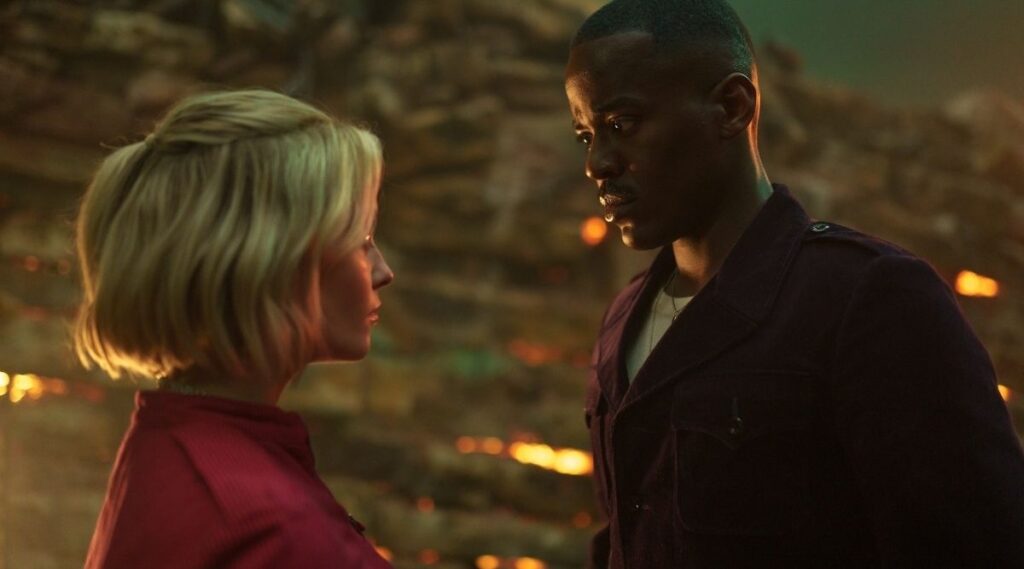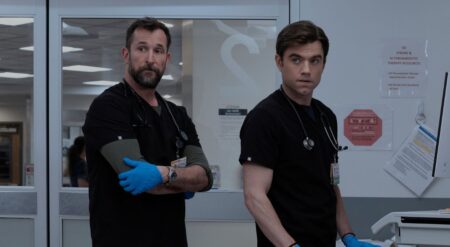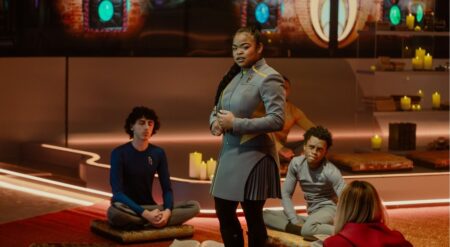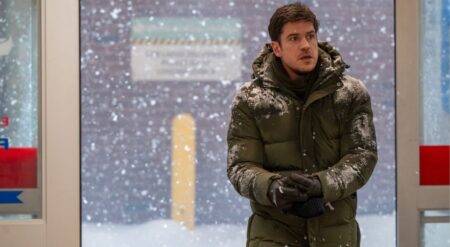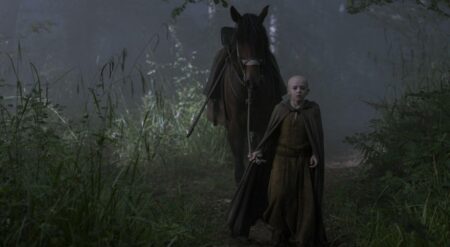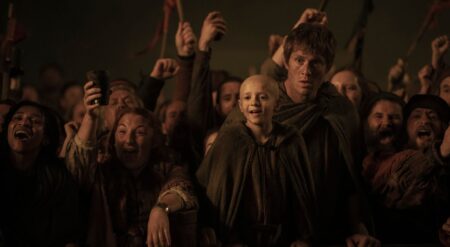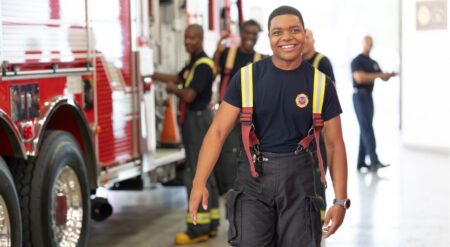Doctor Who Season 1 is the beginning of a new era in the saga of the long-running sci-fi show. With legendary writer Russell T. Davies returning as showrunner, the show became a collaboration between the BBC and Disney. It is also the first full season featuring Ncuti Gatwa as the Fifteenth Doctor, with Millie Gibson as his companion, Ruby Sunday. Through the season, they face the most dangerous gods that the Doctor has ever encountered, creatures made of bogies and try to solve the mystery of Ruby’s mother.
Doctor Who Season 1 is incredibly circular as an entire season, sticking to a single set of plot threads that run from start to finish. Ruby’s real mother. The pantheon. A mysterious woman appearing in every single episode. With a fascinating persistence, Davies keeps these integral to the plot without being too much. And yet, every episode is unique. In true Doctor Who fashion, each edition has its own story, with brand new sets and circumstances. Any time, any place. From war-torn planets to a football stadium in Cardiff.
Some of the episodes are built to be delightful, energetic fun. “Space Babies” shows us how chaotic and silly Doctor Who can get, with babies piloting a spaceship. But then “Boom” can also be a scathing, furious dressing down of society. Even horror is split into genres, from supernatural to psychological. The episodes have complete narratives but contain puzzle pieces from a jigsaw that will protect the universe.
Even “73 Yards”, which seems disjointed and awkward at first viewing, suddenly becomes the most important. The final episode is the culmination of all the story threads, exploding in a confrontation no one saw coming. The ending is satisfying and feels complete, neatly bringing Ruby and the Doctor’s story to a close.
The characters and performances are sensational, but the show’s changed format dramatically impacts them. Formerly, when Doctor Who existed solely as a BBC creation, there were between 10 and 13 episodes. But with Disney involved, this has been reduced to eight. This impacts the time the Doctor and Ruby have together in their first season, traveling as a duo. There isn’t time to get to know them fully, the intricate quirks that flesh the characters out.
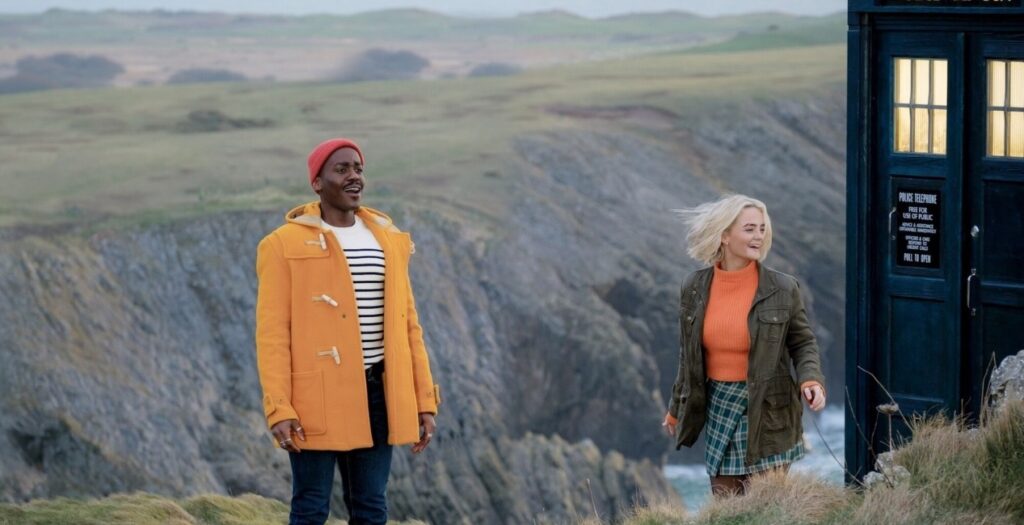
Because the primary story is so integral and there are so many threads leading towards the final episode, it doesn’t allow for important asides and whimsical wonder that are found in previous seasons. This is restricted further by Gatwa’s other filming commitments, limiting him to a starring role in only 6 out of the eight episodes.
That being said, the characters and the performances are excellent in that short time. The skill and talent of both young actors leading the charge are tested early in the production. Gibson’s first day on set was scenes where she was entirely on her own, within an episode in which the Doctor barely appears. Gatwa’s first day was a dramatic confrontation with a woman that included incredibly heavy themes and topics, forcing him to face some of the darkest topics Doctor Who has ever encountered.
Gatwa is a tremendous Doctor, stepping into the TARDIS with none of that responsibility weighing on him. The boisterous energy is there from the start as he bounces around locations. The positivity that radiates from him is instantly lovable. He is kind and gentle to everyone. But then there are those periods where the Dcotrs will face the monsters of the universe, and that is also captured superbly. Gatwas faces down gods, emanating power and status of his own.
The actor’s stage background can be seen in every scene he is featured in. He’s intensely physical, able to throw himself around the set and be brilliantly expressive with his body. His voice is loud, projecting across space and time. For much of the show, he has to be an action hero, but in “Rogue,” he delivers a scintillating romantic performance. He can dance, he can sing, he can fight. He can do anything.
Gibson is also terrific. She steps into this enormous role from another enormous property, ITV’s Coronation Street. Spending so much time in a soap opera benefits her enormously in Doctor Who. She thrives in the family drama elements, with her storyline featuring heaps of absent mothers and complicated family structures. In “73 Yards,” Gibson is in almost every single shot, often entirely alone. She demonstrates the ability to perform alone and as part of an ensemble. She’s the brightest light in any room she is in, with a kindness and levity that generates warmth.
Gatwa and Gibson have many scenes apart, but their chemistry together is exhilarating when they get a chance to show it. They bounce off each other like golden retrievers, both filled with energy. They treat the world with a wide-eyed sense of wonder, a one-two punch of fun. They can be tenacious and tender if needs be. By the end of the season, even with the reduced episode count, the connection between them is solid and palpable.
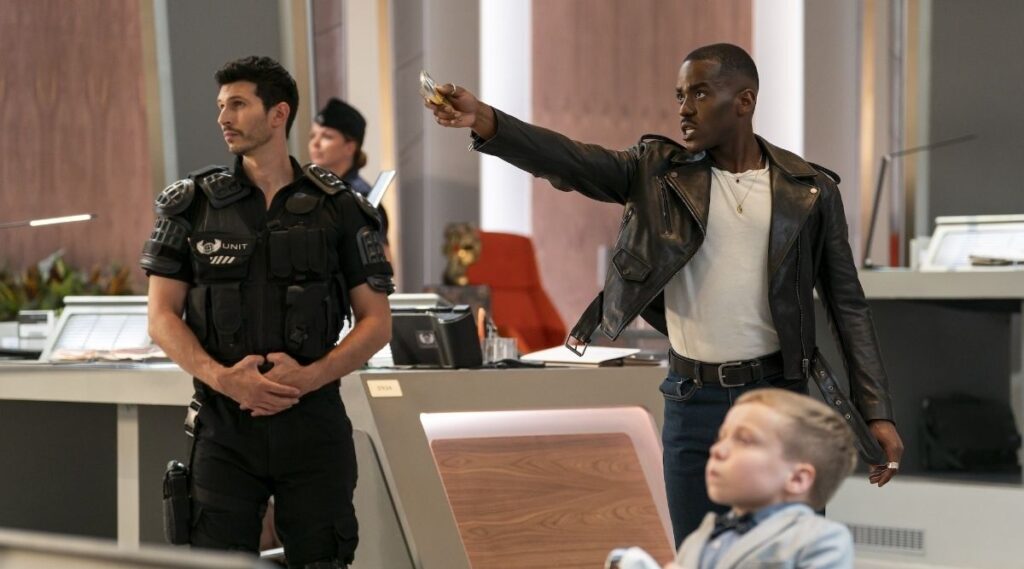
The production team for Doctor Who is among the best in the world, and they have been amplified with a larger budget. There is a dedication to making the episodes look and sound incredible. If the design teams can bring something to life practically, they will do it.
Creatures that I had thought were entirely CGI have been painstakingly made real, with an overheated and cramped puppeteer or actor stuck inside. The sets are also real, with alien skies projected in the background so the actors get a visual cue from which to react. Murray Gold’s orchestral scores are empowering and enthralling, and he has a musical episode to flex his muscles into.
Doctor Who Season 1 is a heartwarming return. The show’s reboot faces both benefits and negatives from the introduction of Disney’s influence. Reducing the number of episodes does gut the seasons of more time with characters that showed only a glimpse of how brilliant they could be together.
However, the increased budget also leads to more ambitious storytelling and stunning special effects. The eight episodes are all bold and sensational, and the individual parts within Doctor Who are fantastic. Gatwa and Gibson have been absolute gems in their first full season, especially the latter. Much responsibility fell on the young actress, something that she shouldered terrifically.
Davies’ writing and understanding of the characters is second to none, as is the direction of the episodes. The production is better than I have seen in almost 20 years of viewing. And at its core, the show’s heart is still beating proudly. Every crew member was dedicated to the cause. And there is still love, respect, and reveration in the classic era. That a 91-year-old voice actor returned to play the final villain of the season is just a brief example of the connection this show will always have with its history.
Doctor Who Season 1 is available on BBCiPlayer in the UK and Disney+ everywhere else.
Rating: 8

